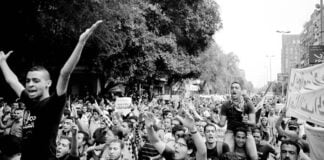Review: The frock-coated communist By Tristram Hunt
Allen Lane $59.95
As establishment economists struggle to explain capitalism’s crisis, the ideas of Karl Marx are enjoying a renewed legitimacy.
The sight of French Prime Minister Sarkozy leafing through the pages of Das Kapital aroused the attention of European tabloids.
A manga edition of the work hit Japanese bookstores last Christmas and sold 6000 copies in three days. Marx’s prediction that an increasingly globalised capitalism would mean increasingly worse crises is being affirmed by news of the spreading instability of the system.
But the rediscovery of Marx’s thought is incomplete with considering the contribution of Friedrich Engels, Marx’s lifelong intellectual collaborator and co-founder of “scientific socialism”.
Through his book The Frock Coated Communist, Tristram Hunt, a successful young historian and contributor to The Guardian, has generated some very broad discussion on the ideas of Engels.
This book is a long-overdue account of Engels’ major intellectual contributions to Marxist thought—from his early study of the working class in Manchester to his later writings on the foundations of capitalist economy, philosophy and the oppression of women.
The early years
From an early age Engels sought out radical ideas—and was often forced to live as a double agent. The book describes the anguish of a young Engels whose politics, atheism and activity were a constant source of worry for his father. Freed from his parents’ stultifying grasp at university, he was attracted to the ideas of the philosopher Hegel. Hegel’s thought gave philosophical expression to the political ferment that had gripped Europe since the French revolution in 1789. He argued that the universe is in a constant process of development and change. His worried father sent Engels to England to run the family company, in an unsuccessful attempt to stifle his radicalism.
Engels arrived in Manchester only weeks after one of the first displays of the power of the working class, the Chartist General Strike. A class movement was growing up in protest at the horror of the factories, and it had an electrifying effect on the young Engels’s ideas. He wrote in 1844:
“For although industry makes a country rich, it also creates a class of unpropertied, absolutely poor people… the slightest fluctuation in trade leaves thousands of workers destitute… in danger of starving to death. And a crisis of this kind is bound to appear again in a few years’ time.”
The city’s mass of filthy slums had grown up around the cotton industry—infant mortality, epidemic disease and overcrowding were facts of life. Engels’s landmark text, The Condition of the Working Class in England, documents this brutality. As well as close detail of appalling living conditions, Engles argues for a struggle to change them. Woven through is the foundation stone of an analysis of the capitalist system. As Lindsey German describes in her biography of Engels:
At the heart of the misery Engels describes is the very nature of the capitalist system. The competition between capitalists leads them to pay their workers as little as possible, while trying to squeeze more and more work from them … This leads in turn to competition between workers for jobs, and to the creation of a pool of unemployed who can be pulled into the workforce when business is booming, and laid off again when it is slack. The existence of this reserve of unskilled and unemployed workers – especially among the immigrant Irish in the cities of the 1840s—holds down the level of wages and conditions for all workers.
Engels channelled his thoughts into action. Alongside the emergence of the first trade unions were movements of small groups of people committed to socialism. Hunt goes through in great detail Engels’s various experiences with the different Utopian socialist currents he was a part of in England, currents he would come to criticise for their idealism in Socialism: Utopian and Scientific.
The Utopians argued it was possible to persuade society’s rulers to change things through peaceful means and rational argument. Engels was one of the first to see that that exploitation of workers—the extraction of surplus from the labour of the majority by a minority—could not be argued away. The logic of competition he theorised in The Condition of the Working Class in England had come to overrule human need. Winning socialism required this to be confronted and overturned by workers in struggle.
Developing socialist theory
Engels placed private property at the centre of his analysis. Hunt describes the illuminating effect of applying the Hegelian concept of alienation to the realm of political economy:
“Competitive capitalism, through its systems of property, money and exchange, involved a disfiguring process of alienation from the authentic human essence … man was divorced from himself and became the slave of things.”
Engels concluded:
“If we abandon private property, then all these unnatural divisions will disappear… it will be the reconciliation of mankind with nature and with itself.”
His thoughts brought him closer to Marx, who said later in life that Capital was based on these foundational discoveries of Engels, detailed in Outlines of a Critique of Political Economy.
Their first written collaboration was The Holy Family in 1844 and then The German Ideology in 1846, both attacking the ideas that dominated German philosophical and political thinking. Back in Germany, Engels and Marx began to develop the foundations of historical materialism. They argued that an understanding of the world needed to start not from the ideas that existed in people’s heads in a particular historical period—but from the real, material conditions in which these ideas arose: “Life is not determined by consciousness, but consciousness by life”.
In late 1847 Engels and Marx were selected to write a draft platform for the London Communist League. They produced what later became The Communist Manifesto, originally titled The Principles of Communism. As Hunt describes, it was a clarification of their interventions into the Communist movement. A radical addition was Engels’s suggestion “that the coming communist order would transform relations between the sexes, since it abolished private property and educates children communally, thus destroying the twin foundation of hitherto existing marriage—the dependence through private property of the wife upon the husband and of the children upon the parents.”
It was the beginning of an analysis of women’s oppression that fleshed out the emancipatory nature of socialism and the necessity of women’s liberation. The revolution would be, as Lenin later called it, the “festival of the oppressed”.
Hunt does not shy away from detailing the misogyny of Engles’s early years; his frequent soliciting of prostitutes and revolting comments about young women. Engels was not immune to the prejudices of bourgeois society. But he came to a profound critique of women’s oppression through experience and discussion.
Later in The Origin of the Family, Private Property and the State Engels laid the basis of a theory which located women’s oppression in the organisation of class society—a view which set him well in advance of liberal commentators in Victorian England, who all too often saw women as the weaker sex, in need of protection. As Engels later wrote: “only in a revolution [can the working class] succeed in ridding itself of all the muck of ages and become fit to found society anew”.
Engels’s legacy
Engels’s contribution and devotion to the cause of socialism was astonishing. He was a brilliant mind who saw his science as a weapon in the fight for socialism. He saw the unity of theory and practice as the unity of theory with class struggle.
After some time in the Utopian socialists in England and the League of Communists, Engels really cut his political teeth during the years of the German revolution. This was an aborted bourgeois revolution, not a workers’ revolution—which meant that the liberal capitalists and the middle classes determined the course. Hunt misunderstands the significance of these revolutions and Engels’ contribution—dismissing his involvement as an indulgence in a “fetish” for military strategy.
This is of a piece with Hunt’s anxiety that Engels’s lifestyle and class background tarnishes the quality of his theoretical contribution. Is someone who wants to get rid of the system wrong to participate in its evils? Engels made a very good income running the family-owned factory in Manchester between 1850 and 1870: the source of his wealth was the surplus value that both he and Marx had analysed. Hunt’s own research provides the much needed answers to the question:
In truth, the middle decades of Engels’s life were a wretched time. He was exiled [from Germany] back to Manchester, humiliatingly forced to return to Ermen & Engels, and the twenty years he then spent in the cotton trade was an era of nervous sacrifice… to maintain his office job, keep Marx out of penury and the communist cause afloat Engels was forced to maintain a facade of painful propriety. It nurtured a contradiction between public commitments and personal beliefs which proved impossible to maintain as he spiralled towards illness, depression and eventual breakdown.
Ultimately Hunt’s portrayal is sympathetic—and a reminder of the ongoing need for the kind of radical social change that Engels envisioned so long ago. He ends with a description of workers in China and concludes that “the awful irony is that such unleavened exploitation…was never Engels’s vision of society.” There is no doubt as to whose side Engels would be on: “For him and Marx, the welcome abundance offered by capitalism deserved to be distributed through a more equitable system. For millions of people around the world today, that hope still holds.” We still have a world to win.
By Amy Thomas




